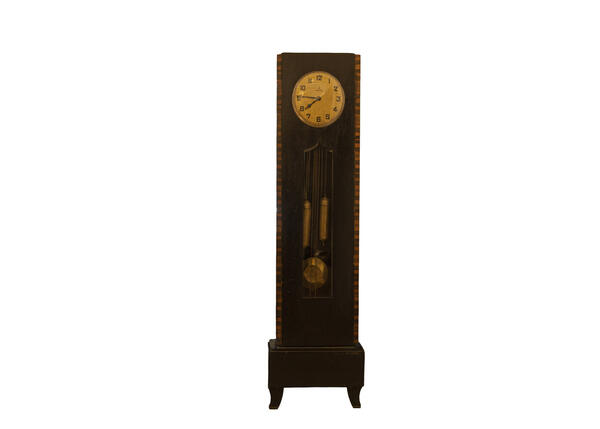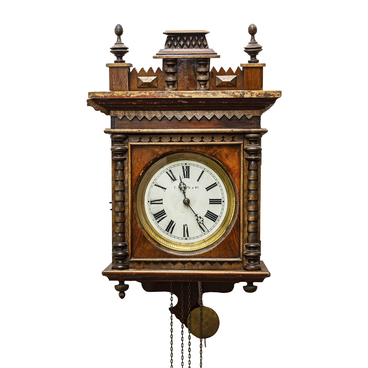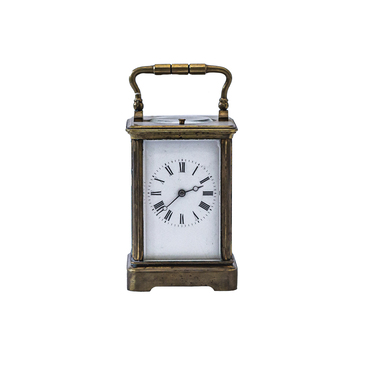The “Gustav Becker” clockmaking company is considered to be one of the most famous in the world. Its founder Gustav Becker was born in Silesia in 1819. In 1837, he graduated from a specialized school and perfected his skills for ten years in Vienna.
In 1847, Becker moved to Freiburg in Germany and opened his own workshop. It was based on the model of Viennese enterprises, which from the end of the 18th century produced the so-called “pendulum clocks” — wall-mounted weight-driven clocks (from the French “pendelue” — “pendulum”). They were placed in wooden four-sided glazed cases, which were decorated with carved ornaments.
The Becker’s workshop began to produce similar clocks. At first, the artisan himself created cases, mechanisms, and intricate decorative elements. As the production grew, a team of hired clockmakers began to do most of the work. In doing so, Becker, as the founder of the company, remained the chief designer and personally supervised the production of each batch.
In 1852, he managed to open a small store. In the same year, an industrial exhibition was held in Silesia, where the public was presented with a clock under the brand name “Gustav Becker”. The brand name was presented in the form of an anchor and two initial letters “GB”. The clockmaker’s products were noticed, and his company became famous.
In 1860, Becker established a big factory based on his workshop, which became the first interior clock factory in Germany. He invited the best artisans from all over Europe to work with him.
In 1875, Gustav Becker received an important order from Emperor Wilhelm to produce three hundred thousand clocks for the royal court. After he completed the task, the master became an honorary member of the Royal Society of Merchants. His clocks won many awards at trade shows around the world for their high quality, design, and accuracy.
In 1885, the company produced five hundred thousand clocks in honor of first chancellor Bismarck. The decoration of the cases symbolized Bismarck’s struggle for the unification of Germany.
In September of the same year, 1885, Gustav Becker passed away. The firm was headed by his son Paul, and under his leadership the company became one of the world’s largest exporters of so-called “big clocks” (from the German “gross Uhren”), wall-mounted and floor clocks.
In 1847, Becker moved to Freiburg in Germany and opened his own workshop. It was based on the model of Viennese enterprises, which from the end of the 18th century produced the so-called “pendulum clocks” — wall-mounted weight-driven clocks (from the French “pendelue” — “pendulum”). They were placed in wooden four-sided glazed cases, which were decorated with carved ornaments.
The Becker’s workshop began to produce similar clocks. At first, the artisan himself created cases, mechanisms, and intricate decorative elements. As the production grew, a team of hired clockmakers began to do most of the work. In doing so, Becker, as the founder of the company, remained the chief designer and personally supervised the production of each batch.
In 1852, he managed to open a small store. In the same year, an industrial exhibition was held in Silesia, where the public was presented with a clock under the brand name “Gustav Becker”. The brand name was presented in the form of an anchor and two initial letters “GB”. The clockmaker’s products were noticed, and his company became famous.
In 1860, Becker established a big factory based on his workshop, which became the first interior clock factory in Germany. He invited the best artisans from all over Europe to work with him.
In 1875, Gustav Becker received an important order from Emperor Wilhelm to produce three hundred thousand clocks for the royal court. After he completed the task, the master became an honorary member of the Royal Society of Merchants. His clocks won many awards at trade shows around the world for their high quality, design, and accuracy.
In 1885, the company produced five hundred thousand clocks in honor of first chancellor Bismarck. The decoration of the cases symbolized Bismarck’s struggle for the unification of Germany.
In September of the same year, 1885, Gustav Becker passed away. The firm was headed by his son Paul, and under his leadership the company became one of the world’s largest exporters of so-called “big clocks” (from the German “gross Uhren”), wall-mounted and floor clocks.



